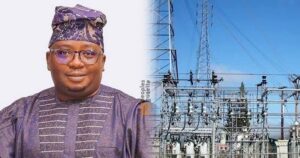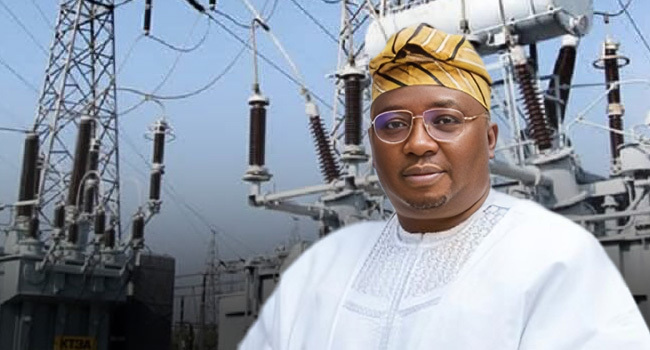Nigeria’s national grid has hit a new milestone, reaching a record high of 5,313 megawatts, a feat that marks the highest energy generation in the past three years. This remarkable achievement was announced by the Minister of Power, Chief Adebayo Adelabu, during his address at an event in Beijing, China, on the eve of the opening ceremony of the African-China Co-operation Summit on Tuesday. The increase in power generation is seen as a significant step forward in Nigeria’s ongoing efforts to stabilize and improve its energy sector, which has long been plagued by inefficiencies and shortages.
While celebrating this milestone, Chief Adelabu also called on Distribution Companies (DISCOs) to make full use of the additional power supply to avoid grid overload and collapse. He explained that the grid’s stability depends on the balance between the power generated and the amount of energy distributed. When DISCOs fail to pick up the energy produced, it leads to frequency drops, which could potentially destabilize the grid. The Minister emphasized that it is now more crucial than ever for DISCOs to rise to the occasion, ensuring that the power generated reaches consumers without delay.
 Adelabu also discussed the Federal Government’s plans to encourage industries to purchase bulk energy, which would further ease the pressure on the grid and contribute to the overall stability of the energy distribution system. He underscored the importance of private-sector involvement, noting that the government alone cannot shoulder the burden of energy distribution. As Nigeria’s industrial sector grows, the demand for stable power will only increase, and industries are encouraged to tap into this growing energy supply.
Adelabu also discussed the Federal Government’s plans to encourage industries to purchase bulk energy, which would further ease the pressure on the grid and contribute to the overall stability of the energy distribution system. He underscored the importance of private-sector involvement, noting that the government alone cannot shoulder the burden of energy distribution. As Nigeria’s industrial sector grows, the demand for stable power will only increase, and industries are encouraged to tap into this growing energy supply.
In a move to strengthen Nigeria’s renewable energy capacity, the Federal Government signed two Memoranda of Understanding (MoUs) with the Chinese company, Mutual Commitment Company Limited, during the same event. The signing ceremony, which was facilitated by the Rural Electrification Agency (REA), signifies a step forward in Nigeria’s efforts to diversify its energy sources, particularly by expanding its renewable energy capacity. The MoUs were signed in the presence of key Nigerian officials, including the Minister of Power, Chief Adebayo Adelabu, and the Managing Director of the REA, Abba Aliyu.
During his speech at the ceremony, Adelabu stressed the importance of the MoU signing, describing it as a memorable day for Nigeria, especially in the context of the country’s renewable energy ambitions. He congratulated both the REA and the National Power Training Institute of Nigeria (NAPTIN) for their pivotal roles in making the event possible. Adelabu said that this collaboration would significantly contribute to achieving Nigeria’s vision for the renewable energy subsector, which is a vital part of the country’s broader electricity sector value chain.
Adelabu noted the special relationship between Nigeria and China, highlighting the many similarities between the two nations. Both countries, he pointed out, have large populations, and with such populations come immense pressure on resources, particularly energy and employment. He emphasized that the signing of these MoUs aligns with President Bola Tinubu’s “Renewed Hope Agenda,” which prioritizes job creation and energy access. He expressed his optimism that this partnership with China would help Nigeria address both challenges simultaneously, creating job opportunities while expanding energy access across the country.
The Minister reiterated President Tinubu’s commitment to the power sector, which has been identified as the cornerstone for driving growth in all other critical sectors of the economy. According to Adelabu, the President has provided unwavering support to ensure that the Ministry of Power can deliver on its promises. He highlighted the government’s focus on expanding energy access, noting that a strong, stable, and reliable electricity sector is essential for any meaningful development to take place in Nigeria.
Adelabu also acknowledged the longstanding issue of centralization within Nigeria’s power sector, which he said has hampered progress. For years, the country’s over-reliance on a centralized power system has prevented energy from reaching many rural and underserved areas. To address this, the government has now adopted a distributed power model, which aims to decentralize energy distribution and ensure that every Nigerian, particularly those in rural areas, has access to reliable electricity.
Nearly 40 percent of Nigeria’s population still lacks access to electricity, a situation that has devastating consequences for economic growth and quality of life. Many rural communities, as well as educational institutions and healthcare facilities, continue to experience erratic power supply, which hampers their operations and development. Adelabu explained that the distributed energy model would expand access to electricity in rural areas, benefitting businesses, schools, and healthcare facilities alike. He emphasized that renewable energy is a key component of this strategy, as it is scalable, sustainable, and can operate independently of the national grid.
The Minister also spoke about Nigeria’s commitment to transitioning to cleaner energy sources as part of its efforts to combat climate change. The country has set ambitious targets, including achieving net-zero carbon emissions by 2060 and ensuring that 30 percent of its energy generation comes from renewable sources by 2030. Renewable energy, he said, is no longer just a focus but a necessity for Nigeria’s future energy security.
The MoUs signed with the Chinese company are expected to focus on five key areas, starting with the development of local capacity. Adelabu pointed out that much of the human and material resources needed for renewable energy projects in Nigeria are still heavily dependent on imports. The government’s goal is to gradually reduce this dependence by building local capacity to meet the growing demand for renewable energy.
Additionally, the renewable energy sector is expected to generate employment opportunities for Nigeria’s rapidly growing population. With thousands of graduates entering the workforce every year, renewable energy projects have the potential to provide much-needed jobs for the country’s youth. By focusing on local assembly and production, Nigeria can create jobs while reducing the foreign exchange spent on importing energy equipment.
Adelabu also compared Nigeria’s energy access levels with those of other African countries, noting that nations like Tunisia, Morocco, Egypt, and Algeria have achieved near-total electrification, while South Africa has reached 95 percent. Nigeria, by contrast, is lagging behind at just 62 percent. Despite this, the Minister expressed confidence that Nigeria has the resources and the potential to achieve similar levels of electrification, citing the country’s abundant natural resources, including gas, hydropower, wind, and solar energy.
In his closing remarks, Adelabu emphasized that the MoU signing would be a game-changer for Nigeria’s energy sector. He expressed optimism that the partnership would lead to a significant increase in electrification rates, which would, in turn, boost Nigeria’s Gross Domestic Product (GDP) by fostering economic activities that depend on reliable power supply.




